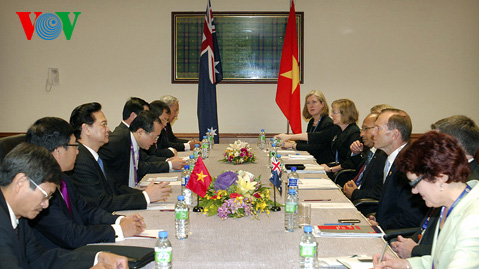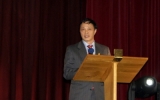Relations based on solid foundations
Australian Foreign Minister Julie Bishop began a three-day visit to Vietnam on February 17 to strengthen cooperation in various areas between the two countries.
She looks back over 40 years of Australia-Vietnam relations and highlights a wide range of future cooperation areas in an article written exclusively for Vietnam Investment Review.
“I am delighted to be in Vietnam for the first time as Australia’s Foreign Minister.
Last year marked the 40th anniversary of diplomatic relations between Australia and Vietnam and we also celebrated how far this relationship had come, for our linkages are broad and deep. We have engaged constructively in defence, security and law enforcement, and we are building a strong trade and investment relationship underpinned by our complementary economies.
Australia is Vietnam’s fourth largest bilateral donor of development assistance and remains a popular destination for Vietnamese students, with more Vietnamese choosing to study in Australia than any other country.

Vietnamese PM Nguyen Tan Dung and his Australian counterpart Tony Abbott agreed to boost the comprehensive partnership between the two countries during their meeting on the sidelines of an ASEAN Summit in Brunei in October 2013
Building on these solid foundations, the anniversary also marked an opportunity to develop a shared vision for the next 40 years of Vietnam-Australia relations. During my time in Vietnam, I will visit both Hanoi and Ho Chi Minh City to work towards a shared vision and further deepen the friendship between our two countries.
Australia is an open, export-oriented market economy integrated into the Indo-Pacific region. Australia’s long-term prosperity and security is therefore intrinsically linked to that of our neighbours. For this reason I place economic diplomacy at the core of Australia’s engagement with the region, including Vietnam. Just as the goal of traditional diplomacy is peace, the goal of economic diplomacy is prosperity.
Our nations are increasingly connected. No one country can be prosperous without the prosperity of others. I strongly believe all countries in our region can benefit from well-targeted economic diplomacy. This is particularly true for Vietnam and Australia.
Economic diplomacy means supporting growth and economic development, particularly in our region. Australia is actively supporting economic growth in Vietnam and helping to improve the living standards of the Vietnamese people. It is vital that we strive to create the right conditions for trade and investment to flourish. Well targeted development assistance is an important part of these efforts.
Development cooperation has long been, and remains, one of the pillars of our bilateral relationship. In 2013-14, Australia will provide US$136.3 million in aid to Vietnam. Our assistance is designed to help address remaining poverty issues by promoting economic growth and integration, developing infrastructure and human resources as well as overcoming environmental challenges. Australia’s aid programme in Vietnam directly addresses key challenges confronting the nation as it strives to become an industrialised economy.
As part of this programme, Australia is funding the construction of the Cao Lanh bridge in the Mekong Delta. This project will transform the local economy in Dong Thap province, help attract investment and create opportunities for movement of people and goods to markets across the Mekong Delta and beyond. It is a concrete example of Australian aid directly contributing to ASEAN connectivity and helping drive economic growth in our region.
For any country to reach its full potential, it is essential to develop a well-trained and educated workforce to make the most of the trade and economic opportunities in an increasingly interconnected region. Australia is the leading provider f government-funded scholarships to Vietnam, providing around 4,500 scholarships to the country over the past 40 years. This includes 462 Australia Awards offered in 2013 alone. These scholarships offer future leaders an opportunity to undertake study, research and professional development in Australia. Scholarships to study in Australia are actively contributing to the development of human resources and skills development in Vietnam to support economic growth and improve the livelihoods of all Vietnamese.
However, scholarships are only part of the story. Education is now Australia’s largest export to Vietnam. In 2013, there were over 24,500 Vietnamese students enrolled in Australia. Leading Australian education providers are also investing in Vietnam, including RMIT, the University of Queensland, the University of New South Wales and La Trobe University. There are approximately 12,000 Vietnamese students studying in Australian higher education and vocational education courses in Vietnam.
There is more we can do from the Australian side to boost our trade and development ties. We also need to ensure the next generation of Australian business people, researchers and professionals are Asia-literate. That is why I am passionate about Australia’s initiative, the New Colombo Plan (NCP). This programme will bolster prosperity and productivity in both Australia and the broader Indo-Pacific region. The NCP will provide Australian under-graduates with the opportunity to study at universities in the region. The programme will include options for these students to undertake internships with local businesses as part of their studies. The NCP is currently in a pilot phase and will be rolled out to the wider region in 2015. I look forward to discussing Vietnam’s involvement in the NCP with my counterparts in Hanoi.
Our economic diplomacy is also about supporting the development of a stronger private sector in the Indo-Pacific region to underpin economic expansion. Australia and Vietnam are developing strong commercial ties, underpinned by complementarities in our two economies. Australian exports to Vietnam have enjoyed an average annual growth of over 16% during the past decade and Australian businesses are actively investing in Vietnam’s growing economy.
With Vietnam’s rapid economic and social growth comes the importance of food and energy security. Australia has and can continue to make significant contribution towards this goal through the provision of commodities, expertise, modern technology and support infrastructure. A number of Australian industry players are already active or have expressed interest in Vietnam’s agriculture and energy-resources sectors. An open, transparent and consistent business and legal environment is however essential to foster further trade and investment.
Economic diplomacy also means continuing to support an open international trading system. Australia’s economy has been a beneficiary of trade liberalisation and we believe that more open and efficient international markets will benefit the Indo-Pacific region. Australia and Vietnam are working closely together to this end. Australia actively supported Vietnam’s accession to the World Trade Organization in 2007. We look forward to working with Vietnam to implement the recently concluded WTO Trade Facilitation Agreement. It is estimated that the agreement could add US$1 trillion to the world economy per annum and create 20 million jobs, 18 million of them in the developing world.
Australia and Vietnam are both participating in important regional economic initiatives: the Regional Comprehensive Partnership Agreement with the countries of ASEAN as well as China, India, Japan, the Republic of Korea and New Zealand, and the Trans-Pacific Partnership Agreement, involving 12 Pacific-Rim countries including the United States and Japan. While concurrently pursuing gains through the World Trade Organization and the multilateral trade system, market access secured under these regional free trade agreements will benefit the exporters and investors of both our countries and enhance economic prosperity.
We will also work closely together in APEC to encourage trade and investment liberalisation and deeper economic integration in our region. Australia is looking forward to intensifying in the lead up to Vietnam’s APEC host year in 2017. We have worked together on finance co-operation and connectivity under the East Asia Summit. Australia is a committed friend and partner of ASEAN. We are committed to working with ASEAN to deliver its goals, including more open trade and investment under the SEAN Economic Community. This year we commemorate the 40th anniversary of the ASEAN Australia dialogue partnership, an opportunity to chart a new strategic direction to our partnership.
With four decades of Australia-Vietnam relations behind us, I am optimistic about the next 40 years. While the bilateral relationship will continue to grow across a range of areas, economic diplomacy will help support our engagement.”
VIR/VOV online



